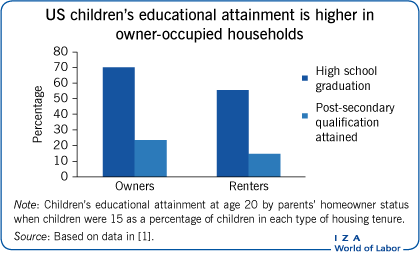Elevator pitch
Homeownership has important economic implications for society and individuals. At the social level is the greater civic engagement that homeowners tend to exhibit, while at the individual level an important outcome associated with housing tenure is better education outcomes, especially for children. The causal impact of tenure, in particular of homeownership, on education is mediated through a range of mechanisms. Evidence for the direct benefit of homeownership itself is less clear, though positive impacts associated with homeownership are stronger for low-income households.
Key findings
Pros
Homeownership is generally associated with benefits such as residential stability, better housing conditions, and civic engagement.
Children in owner-occupied dwellings achieve better education outcomes, including high school completion and college attendance, than children in rental households.
As a large and generally valuable household asset, homeownership provides a means to circumvent capital market imperfections and invest in education.
The benefits associated with homeownership are especially strong for low-income households.
Cons
Homeownership per se does not automatically lead to improved education outcomes; rather, the effects are mediated through mechanisms at the household and neighborhood levels.
The ways in which homeownership enhances education outcomes are not fully understood.
Households self-select into homeownership, so that children in home-owning households would on average achieve better education outcomes irrespective of housing tenure.
Policies to increase homeownership need to be targeted carefully if they are to have positive effects on education outcomes.
Policies that increase homeownership may reduce residential mobility and potentially increase unemployment, offsetting such benefits as those associated with education outcomes.
